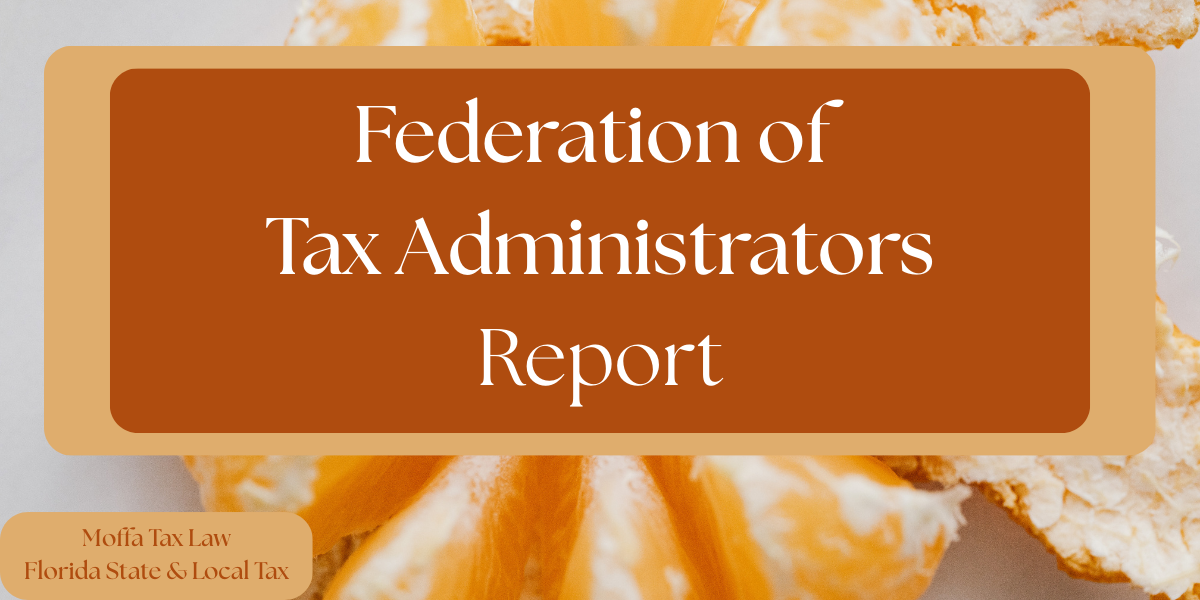NEWS & INSIGHTS


Inside the FTA’s May 2025 Committee Report: What State Tax Officials Are Watching
The Federation of Tax Administrators (FTA) released its May 2025 Committee Report summarizing conference updates, IRS collaboration, and legislative monitoring efforts by state tax officials nationwide. While not focused on litigation or detailed tax policy, the report offers valuable insight into what issues are rising to the top of agency watchlists.
📅 2025 FTA Conference Highlights
FTA hosted several key events in early 2025, including its Compliance & Enforcement Conference, Motor Fuel Tax Section meetings, and multiple regional gatherings for income and sales tax administrators. These sessions continue to be critical forums for interstate coordination and best-practice sharing on audit and enforcement strategies.
🤝 IRS Collaboration & Leadership Transitions
The IRS has been increasingly active in FTA circles. The report notes leadership transitions at the IRS, including new contacts for state coordination. Improved federal-state data exchange remains a major focus, with states seeking real-time access to IRS audit and filing data to better target noncompliance at the state level.
📋 State Legislative Watchlist
FTA’s policy staff maintains a rolling legislative watchlist. In May 2025, key themes included:
- Remote work and telecommuting tax issues
- PTE tax amendments and SALT cap workarounds
- Taxation of digital goods and AI-related services
- Audit authority in tiered partnership structures
FTA shares legislative developments in real time with its member states to support strategic and consistent policy responses.
🛠️ Technology and Enforcement Tools
Several states reported updates to audit software, data analytics platforms, and online taxpayer portals. Technology remains a key area of investment for revenue departments looking to close the tax gap and improve efficiency.
📌 Final Takeaway
While the FTA Committee Report may not make headlines, it’s a valuable look into the operational mindset of state tax agencies. From IRS data coordination to legislative monitoring and tech upgrades, state tax departments continue to evolve — and taxpayers should expect enforcement efforts to keep pace.
Moffa Tax Law | Florida State and Local Tax Attorneys
A national organization supporting state tax agencies through coordination, training, and research.
It includes conference updates, IRS collaboration efforts, legislative monitoring, and technology improvements.
Remote work, PTE taxes, taxation of digital goods and AI, and partnership audit authority.
By improving data-sharing efforts and providing new points of contact for state coordination.
To help states improve audit targeting and enforcement using federal data.
Yes—many reported enhancements to software, portals, and analytics platforms.
Compliance & Enforcement, regional income and sales tax meetings, and motor fuel tax sessions.
It signals where state tax departments are focusing their attention — and their enforcement efforts.
No, it’s more operational in nature, geared toward agency coordination and administration.
That state tax departments are modernizing rapidly — and staying one step ahead will require active monitoring and preparation.
Share
Additional Articles by the SALTy Orange at Moffa Tax Law:
NEWS & INSIGHTS Inside the FTA’s May 2025 Committee Report: What State Tax Officials Are Watching Inside the FTA’s May…
NEWS & INSIGHTS State Conformity with the BBA Partnership Audit Rules: Where Are We in 2025? State Conformity with the…
How Florida’s Sales Tax Auditors Target Convenience Stores (and What You Can Do About It)”
NEWS & INSIGHTS How Florida’s Sales Tax Auditors Target Convenience Stores (and What You Can Do About It) Florida Department…

Jeanette Moffa, Esq.
(954) 800-4138
JeanetteMoffa@MoffaTaxLaw.com
Jeanette Moffa is a Partner in the Fort Lauderdale office of Moffa, Sutton, & Donnini. She focuses her practice in Florida state and local tax. Jeanette provides SALT planning and consulting as part of her practice, addressing issues such as nexus and taxability, including exemptions, inclusions, and exclusions of transactions from the tax base. In addition, she handles tax controversy, working with state and local agencies in resolution of assessment and refund cases. She also litigates state and local tax and administrative law issues.


